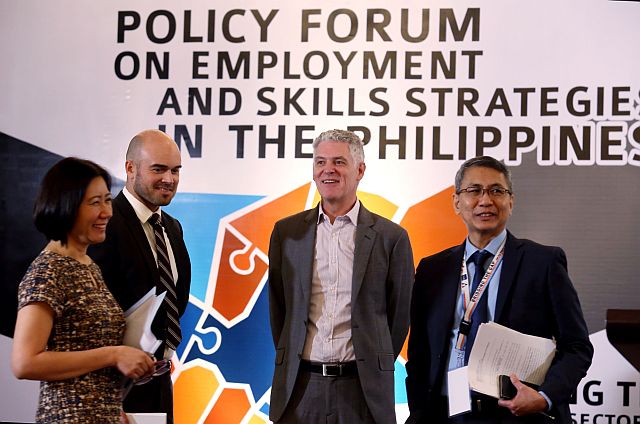Private sector involvement needed to boost employment

Jonathan Barr (second from left), senior policy analyst of the Organization for Economic Cooperation and Development-Local Employment and Economic Development program; and Kelly Bird (3rd from left), director of Public Management, Financial Section and Trade Division of Asian Development Bank, are among the speakers of the Policy Forum on Employment and Skills Strategies in the Philippines in Cebu City. With them are Dominique Rubia-Tutay, Dole-Bureau of Local Employment (left) and Labor Undersecretary Alex Avila (right). (CDN PHOTO/JUNJIE MENDOZA)
Employers should be more engaged in employment and training services to promote job generation and development in Cebu as well as Central Visayas.
This was among the recommendations cited in the study by the Organisation for Economic Cooperation and Development (OECD) on employment and skills strategies in the Philippines.
“More can be done to coordinate with employers. There is a need to work closely with local chambers of commerce so we would know what the employers want from their employees in terms of skills,” Jonathan Barr, OECD-Local Economic and Employment Development (LEED) program senior policy analyst, said in a press conference at Radisson Blu Hotel in Cebu City on Monday.
Policy forum
It was also then that the Department of Labor and Employment (DOLE), in partnership with OECD and the Asian Development Bank (ADB), opened a two-day international policy forum to discuss how to best promote sustainable and inclusive skills policies in the Philippines and the Asean region.
Barr, citing the study, said that social dialogue is a key mechanism through which Public Employment Service Offices (PESO) can better understand the local labor market and future growth possibilities.
The study also highlighted a recommendation for the country to launch programs that encourage stronger employer networks which deliver skills development opportunities and leverage public investment to increase employer participation in training.
Local technical vocation education and training (TVET) institutions in Cebu should also establish program advisory councils with majority of its membership comprised of employees, the study said.
These advisory bodies could provide advice on the relevance of TVET programs to ensure that individuals, who completed their training, would have the right skills and knowledge for the jobs on offer.
Cebu doing well
Barr said that compared to provinces in other regions, Cebu is performing well given the high education and skill level of its workforce.
“I believe Cebu belongs to the upper 25 percentile,” he said.
The study further recommended for better utilization of skills to promote innovation and productivity, stating that while much is being done to promote and expand the BPO sector, there is a risk of devoting too many resources in that area.
“It is also important to work with other sectors of the economy, such as retail, health and educational services to boost the quality of jobs on offer,” said Barr.
PESO model
He cited PESO in Cebu as the one that stood out as a best practice model in the Philippines for the way in which employment and skills services would be integrated into one office.
He also said that it was offering a wide range of training programs, which could be customized and delivered to suit the employer needs.
The ADB, in its Asian Development Outlook 2016 released in March this year, said the government was facing a policy challenge in youth unemployment.
Youth unemployment
Kelly Bird, director of the ADB’s public management, financial sector, and trade division, said that a survey found that college graduates would take about one year to find work while high school graduates would take up to three years.
He said one out of four Filipino youth, aged 18 to 24, are neither in school nor employed.
“The Philippines has a youth unemployment problem,” said Bird.
Start PH program
While noting the need for more programs to provide employment services such as career guidance and coaching for young people when they leave school, Bird also acknowledged the government’s efforts to address this issue such as through the JobStart Philippines program.
Cebu is currently in the first phase of the program, where youth beneficiaries receive full-cycle employment facilitation services including career guidance and coaching, life skills training, technical skills training, and company-based internships.
Under the program, the government would pay employers P9,000 as training fee for every intern the employers would accept.
Disclaimer: The comments uploaded on this site do not necessarily represent or reflect the views of management and owner of Cebudailynews. We reserve the right to exclude comments that we deem to be inconsistent with our editorial standards.
